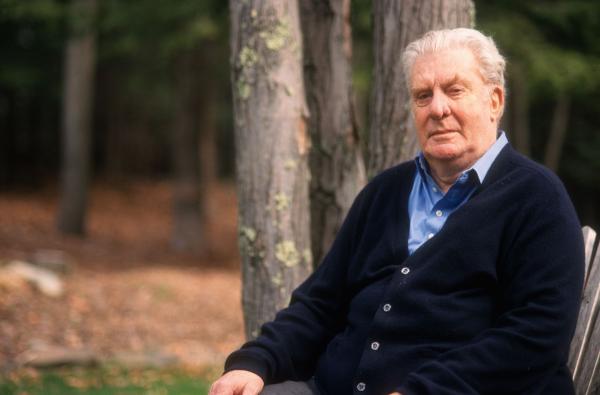Robert Starer: A New Oral History and Music to Explore

November 12, 2019
In the dramatic cantata, Ariel: Visions of Isaiah, composer Robert Starer depicts the triumph of Jerusalem as related in the Book of Isaiah. In that story, Isaiah prophesies that the city will be purged of evil forces in preparation for God's rule. The cantata begins with themes of battle:
I will camp against thee, I will lay siege against thee, and will raise forts against thee. And thou shalt be brought down...
But it ends with the city's redemption and a call for celebration:
Break forth into joy, sing together; for the Lord hath comforted his people, He hath redeemed Jerusalem.
Both the story’s dramatic arc and its placement in Jerusalem have loose parallels with Starer’s own life. Born in Vienna in 1924, Starer was just fourteen years old when he heeded his own father's prophecies and left Europe for the city where David dwelt. "If you can get out, go," he recalled his father telling him after Austria had voted in favor of annexation to Germany in 1938.
In an oral history with the Milken Archive in 1998, Starer reflected on the idea of Jewish music. Listen to the entire oral history interview.
Through an audition with the head of a Jerusalem conservatory, Starer won one of 100 certificates of emigration that had been granted by the British High Commissioner of Palestine, Sir Arthur Wauchope. Once there, Starer studied piano with the composer Joseph Tal, himself a European Jew who had gone to Palestine to avoid the National Socialists. Tal encouraged Starer to study not only Schoenberg, Bartok, and Stravinsky, but the diverse music of his new home as well. He began taking oud lessons and would often notate his teacher’s improvisations. Starer also worked as a radio station accompanist with singers from a broad range of backgrounds and musical traditions, and later served in North Africa in the British Royal Air Force.
The broadening of horizons Starer experienced in Jerusalem proved formative. He began improvising at the piano, often mimicking the slowly building intensity of the oud music he was learning. Starer had enjoyed improvising as a child, but in the high German culture of Vienna at that time such klimpern (tinkling) was frowned upon. Tal, on the other hand, encouraged him not only to continue to improvise, but to start writing things down—something Starer had already been doing while listening to his oud teacher play. Gradually, a composer was born.
Starer’s service in the Royal British Air Force helped earn him a scholarship to the Royal Academy of Music in London. But there were apparently no vacancies, so he wound up at Juilliard in New York and came into contact with several other luminaries of American Jewish music, among them Frederick Jacobi, David Diamond, and Hugo Weisgall—all represented in the Milken Archive.
Though Robert Starer may not be the most familiar name among 20th century composers today, he maintained a distinguished career as both artist and educator—collaborating with the likes of Itzhak Perlman, Martha Graham, and Janos Starker, and being elected to the American Academy of Arts and Letters (1994).

Robert Starer and Michael Isaacson, Brooklyn College. New York, New York. 1968.
In addition to Ariel: Visions of Isaiah, his compositions in the Milken Archive include K’li zemer for clarinet and orchestra (featuring David Krakauer), the virtuosic organ solo, Fantasy on a Sephardi Melody, and several shorter organ pieces for the synagogue. But his influence on the world of Jewish Music cannot be judged by his compositions alone. One of his students at Brooklyn College was the composer Michael Isaacson, who helped the Milken Family Foundation establish the Milken Archive in the early 1990s. In an interview with New Music Box upon Starer’s death in 2001, Isaacson summed up Starer’s personal impact succinctly: “He made me a composer.”
Dive into the full interview, see his artist profile, or stream a playlist through the links below:
Robert Starer: Complete Oral History View Artist Profile Spotify Playlist
